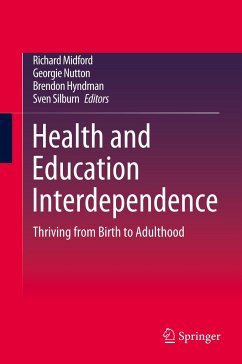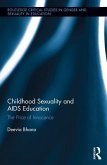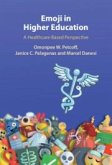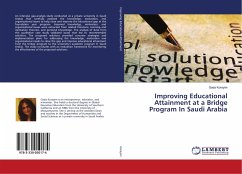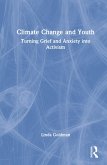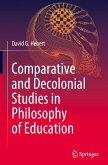Health and Education Interdependence
Thriving from Birth to Adulthood
Herausgegeben:Midford, Richard; Nutton, Georgie; Hyndman, Brendon; Silburn, Sven
Health and Education Interdependence
Thriving from Birth to Adulthood
Herausgegeben:Midford, Richard; Nutton, Georgie; Hyndman, Brendon; Silburn, Sven
- Gebundenes Buch
- Merkliste
- Auf die Merkliste
- Bewerten Bewerten
- Teilen
- Produkt teilen
- Produkterinnerung
- Produkterinnerung
This book explores the interdependence of health and education, and how optimising this important relationship provides the foundation for achieving improved life outcomes from birth into adulthood. Adopting a multi-disciplinary approach, it draws on bio-medical, epidemiological, educational, psychological and economic evidence to demonstrate the benefits of the reflexive, positive associations between good health and educational attainment over the life course. In this, it offers readers insights into the complex nature of the nexus between health and education and how this relationship…mehr
Andere Kunden interessierten sich auch für
![Health and Education Interdependence Health and Education Interdependence]() Health and Education Interdependence77,99 €
Health and Education Interdependence77,99 €![Childhood Sexuality and AIDS Education Childhood Sexuality and AIDS Education]() Deevia BhanaChildhood Sexuality and AIDS Education138,99 €
Deevia BhanaChildhood Sexuality and AIDS Education138,99 €![Emoji in Higher Education Emoji in Higher Education]() Omonpee W PetcoffEmoji in Higher Education131,99 €
Omonpee W PetcoffEmoji in Higher Education131,99 €![Improving Educational Attainment at a Bridge Program In Saudi Arabia Improving Educational Attainment at a Bridge Program In Saudi Arabia]() Gada KorayimImproving Educational Attainment at a Bridge Program In Saudi Arabia38,99 €
Gada KorayimImproving Educational Attainment at a Bridge Program In Saudi Arabia38,99 €![Children and Their Education in Secure Accommodation Children and Their Education in Secure Accommodation]() Children and Their Education in Secure Accommodation200,99 €
Children and Their Education in Secure Accommodation200,99 €![Climate Change and Youth Climate Change and Youth]() Linda GoldmanClimate Change and Youth187,99 €
Linda GoldmanClimate Change and Youth187,99 €![Comparative and Decolonial Studies in Philosophy of Education Comparative and Decolonial Studies in Philosophy of Education]() Comparative and Decolonial Studies in Philosophy of Education108,99 €
Comparative and Decolonial Studies in Philosophy of Education108,99 €-
-
-
This book explores the interdependence of health and education, and how optimising this important relationship provides the foundation for achieving improved life outcomes from birth into adulthood. Adopting a multi-disciplinary approach, it draws on bio-medical, epidemiological, educational, psychological and economic evidence to demonstrate the benefits of the reflexive, positive associations between good health and educational attainment over the life course. In this, it offers readers insights into the complex nature of the nexus between health and education and how this relationship influences development. Health and Education Interdependence: Thriving from Birth to Adulthood is essential reading for education and health researchers and policymakers, teachers and public health and health promotion practitioners, as well as students studying in these fields.
Produktdetails
- Produktdetails
- Verlag: Springer / Springer Nature Singapore / Springer, Berlin
- Artikelnr. des Verlages: 978-981-15-3958-9
- 1st edition 2020
- Seitenzahl: 356
- Erscheinungstermin: 23. Mai 2020
- Englisch
- Abmessung: 241mm x 160mm x 25mm
- Gewicht: 653g
- ISBN-13: 9789811539589
- ISBN-10: 9811539588
- Artikelnr.: 58694535
- Herstellerkennzeichnung Die Herstellerinformationen sind derzeit nicht verfügbar.
- Verlag: Springer / Springer Nature Singapore / Springer, Berlin
- Artikelnr. des Verlages: 978-981-15-3958-9
- 1st edition 2020
- Seitenzahl: 356
- Erscheinungstermin: 23. Mai 2020
- Englisch
- Abmessung: 241mm x 160mm x 25mm
- Gewicht: 653g
- ISBN-13: 9789811539589
- ISBN-10: 9811539588
- Artikelnr.: 58694535
- Herstellerkennzeichnung Die Herstellerinformationen sind derzeit nicht verfügbar.
Richard Midford is a director and clinical psychologist at Perth Psychological Services. He also holds an adjunct professorial appointment at the National Drug Research Institute and an honorary professorial appointment at the Menzies School of Health Research. His research has focused on the development of wellbeing programmes in schools, how alcohol and drug harm prevention programmes can be developed in local communities and prevention of alcohol and drug harm in workplace settings. Georgie Nutton is a senior lecturer in education at Charles Darwin University and is strongly committed to improving early childhood education policy, research and practice. Her current research focuses on understanding community driven social change through a lens of complexity, self-regulation, executive function, and equity in regional and remote contexts, especially in the Northern Territory and Timor-Leste. Brendon Hyndman is the course director of postgraduate studies in education (Post-Initial Teacher Education courses) and a senior lecturer in personal development, health and physical education at Charles Sturt University. A passionate disseminator of educational research evidence to the broader public, his work has focused on raising awareness of the range of influences and strategies that impact on students' engagement in physical activities via informal, pedagogical and curricular approaches. Sven Silburn is the former head of the Centre for Child Development and Education at the Menzies School of Health Research. His research over the past 30 years has resulted in several influential publications. Most recently he led the development of datalinkage research in Australia's Northern Territory utilising population data from health, education, child protection, justice and other administrative sources; and intervention studies in childhood development and parenting, youth life-skills, suicide prevention, and the prevention of foetal alcohol spectrum disorder (FASD).
Part 1: Understanding the Interplay Between Health And Education in Child Development.- Chapter 1. A Preview of How Health and Education Interact to Influence The Course of a Child's Development.- Chapter 2. The Social Determinants that Shape the Relationship Between Health and Education During a Child's Development.- Chapter 3. The Importance of Physical Health: The Impact of Otitis Media on Hearing Loss and Education Outcomes.- Part 2: Perinatal to Preschool: Health and Development during the Early Years.- Chapter 4. Attachment Security: Influences on Social and Emotional Competence, Executive Functioning and Readiness for School.- Chapter 5. Children on the Edge: Starting School with Additional Health and Developmental Needs.- Chapter 6. Children Who Can Guess What's in the Teacher's Head: Understanding Engagement in Schooling from a Sociocultural Perspective.- Chapter 7. Life-Long Benefits of High Quality Preschool Experiences.- Chapter 8. The Child, Between School, Family and Community: Understanding the Transition to School for Aboriginal Children in the Australian Northern Territory.- Part 3: Health and School Success: The Primary Years.- Chapter 9. Nutrition And Learning in the Australian Context.- Chapter 10: Physical Activity and Learning.- Chapter 11. Social And Emotional Learning and Resilience Education.- Chapter 12. Building Emotional Safety for Students in School Environments: Challenges and Opportunities.- Part 4: Continuing the Journey: Health and Success in High School.- Chapter 13. Who Am I? The Role of Health Promotion and School Education in Young People's Sexual Health and Wellbeing.- Chapter 14. Taking a Skills Focused, Harm Minimisation Approach to School Drug Education.- Part 5: Life-Long Implications of the Health Education Nexus.- Chapter 15. Health Literacy Across the Life Course: Understanding the Influence of Culture and Gender.- Chapter 16. The Role of Epigenetics in Shaping the Foundations of Children's Learning.- Chapter 17. Drawing it Together: Understanding the Interaction of Health and Education in the Development Trajectory.
Part 1: Understanding the Interplay Between Health And Education in Child Development.- Chapter 1. A Preview of How Health and Education Interact to Influence The Course of a Child's Development.- Chapter 2. The Social Determinants that Shape the Relationship Between Health and Education During a Child's Development.- Chapter 3. The Importance of Physical Health: The Impact of Otitis Media on Hearing Loss and Education Outcomes.- Part 2: Perinatal to Preschool: Health and Development during the Early Years.- Chapter 4. Attachment Security: Influences on Social and Emotional Competence, Executive Functioning and Readiness for School.- Chapter 5. Children on the Edge: Starting School with Additional Health and Developmental Needs.- Chapter 6. Children Who Can Guess What's in the Teacher's Head: Understanding Engagement in Schooling from a Sociocultural Perspective.- Chapter 7. Life-Long Benefits of High Quality Preschool Experiences.- Chapter 8. The Child, Between School, Family and Community: Understanding the Transition to School for Aboriginal Children in the Australian Northern Territory.- Part 3: Health and School Success: The Primary Years.- Chapter 9. Nutrition And Learning in the Australian Context.- Chapter 10: Physical Activity and Learning.- Chapter 11. Social And Emotional Learning and Resilience Education.- Chapter 12. Building Emotional Safety for Students in School Environments: Challenges and Opportunities.- Part 4: Continuing the Journey: Health and Success in High School.- Chapter 13. Who Am I? The Role of Health Promotion and School Education in Young People's Sexual Health and Wellbeing.- Chapter 14. Taking a Skills Focused, Harm Minimisation Approach to School Drug Education.- Part 5: Life-Long Implications of the Health Education Nexus.- Chapter 15. Health Literacy Across the Life Course: Understanding the Influence of Culture and Gender.- Chapter 16. The Role of Epigenetics in Shaping the Foundations of Children's Learning.- Chapter 17. Drawing it Together: Understanding the Interaction of Health and Education in the Development Trajectory.

